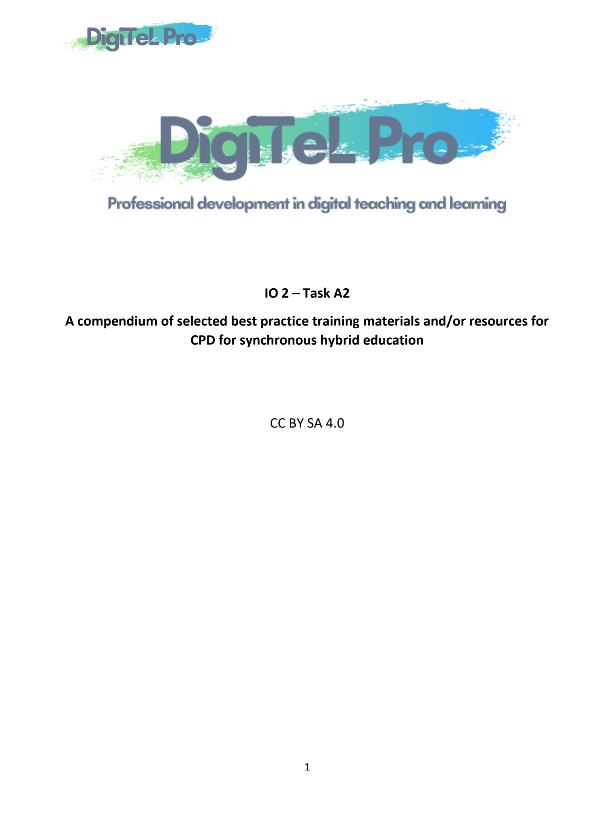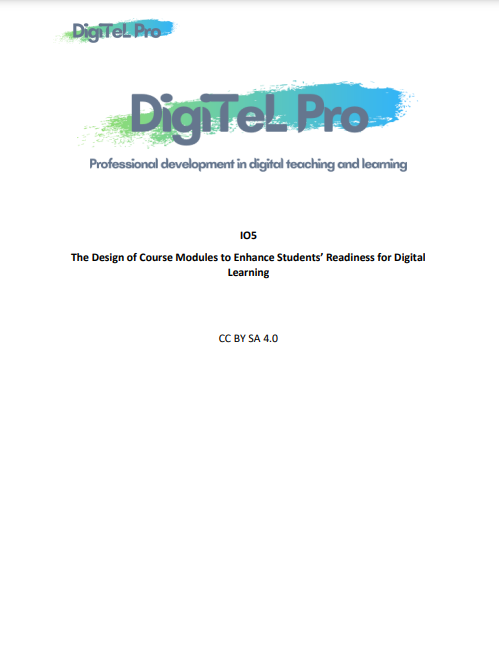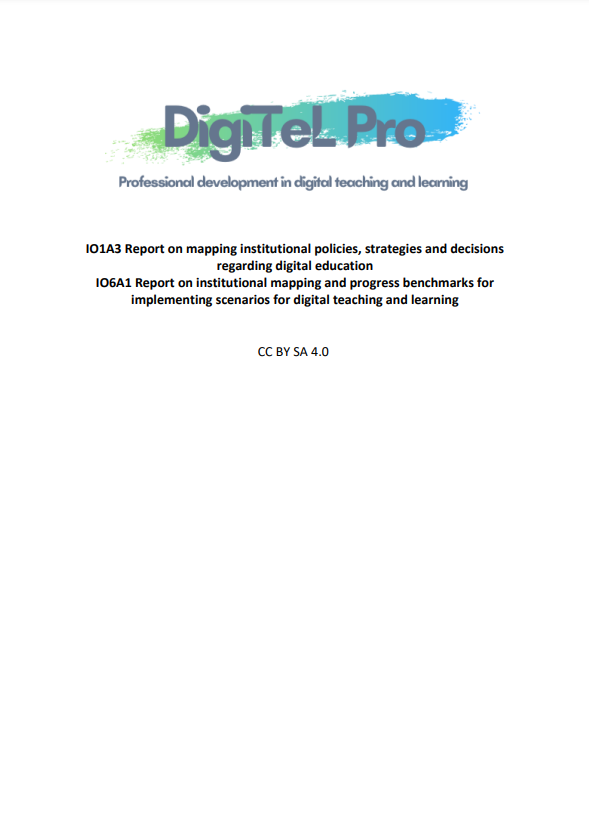Outcomes of the DigiTeL Pro project
Building a strategic partnership for digital education responding to the needs of universities during the Corona crisis and beyond
The objective of the DigiTeL Pro Strategic Partnership was to reinforce the ability of education institutions to provide high quality, inclusive digital education, responding to the needs of universities during the Corona emergency crisis and beyond. First, we mapped the challenges generated by Covid-19 and made inventory of solutions to address the identified needs. This was further translated in institutional strategies to cope with the situation by digital education. These elements were evaluated by the experts of all partners, preparing courses for capacity building, focusing on three main distinct, but connected scenarios: (synchronous) hybrid, blended and online and distance education.
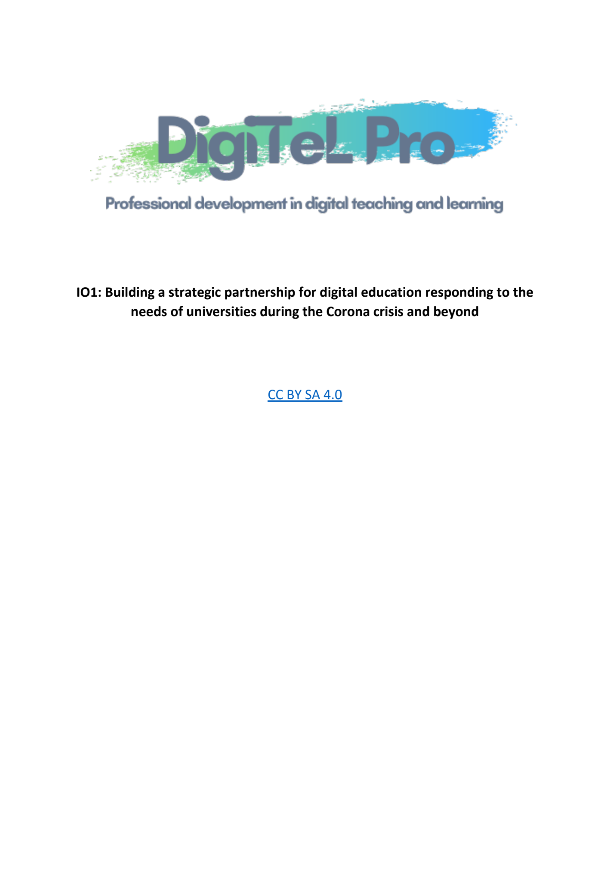
Report on mapping (post-)COVID-19 needs in universities
The partnership investigated and forecast the educational needs of teaching staff and learners within and after COVID-19 by a meta-analysis of relevant documents and reports:
- The May 2020 surveys of the European Commission on the impact of Corona on higher education.
- National surveys, reports, and guides, eg from VSNU (NL); VLIR, VLHORA (BE), IUA (IE), CPU (FR), CRUI (IT)
- Institutional reports and guides, eg from partner universities and associates:
- The teachers’ experience, (eg Irene van der Spoel, Omid Noroozi, Ellen Schuurink & Stan van Ginkel (2020)
- The students’ experience, eg from partners, and national and European student organisations.
Experts participated in the meta-analysis, which led to a mapping of the needs and expectations of teaching staff and leadership.

A compendium on (patterns) of good educational practices in the COVID-19 context
In this document the Open Universiteit experts analyzed patterns of emergency and post-emergency practices in teaching and learning in the partnership as anchoring points for improvement. Five best practices of course design in the COVID-19 context per institution were e analyzed. They can cover different formats: synchronous hybrid, blended and online and distance courses; continuing education courses, international courses and virtual mobility, etc.
Design, development and implementation of continuous professional development for synchronous hybrid education
Throughout the DigiTeL Pro project the imec research group at KU Leuven, developed and implemented a CPD course for synchronous hybrid learning, based on the work on Technology-Enhanced Collaborative Learning.
Synchronous hybrid education is based on settings that have in common that both on-site or ‘here’ students and remote or ‘there’ students are simultaneously included during learning activities. The challenge in the research studies was to make synchronous hybrid teaching and learning as effective as teaching in real-life.
The objective of was to design, develop and implement a CPD course to enhancing synchronous hybrid teaching and learning , making use of R&I and practices developed already during the COVID-19 period. The course also connects with institutional change.
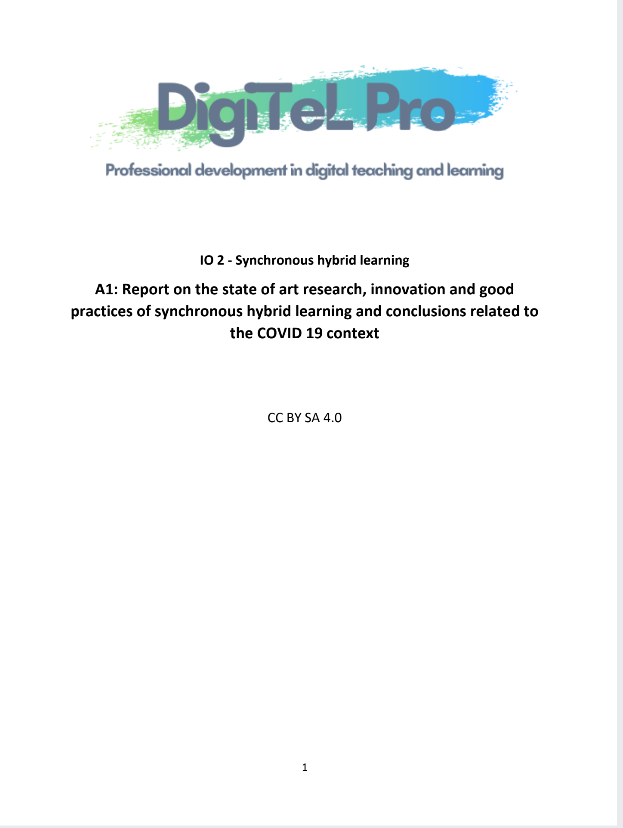
An open access report on the state of the art research, innovation and good practices of synchronous hybrid learning
This report is a synthesis of contemporary research oriented to the design and development of synchronous hybrid learning in an emergency situation and conditions for change management. This limited analysis refocusses the conclusions of existing reviews and intervention studies on the COVID-19 needs (A. Raes e.a., 2019, 2020; Zydney e.a., 2019) and of studies on interactions and collaboration in virtual classrooms and hybrid learning environments (Raes e.a., 2020; Butz e.a., 2017; Szeto e.a, 2016).
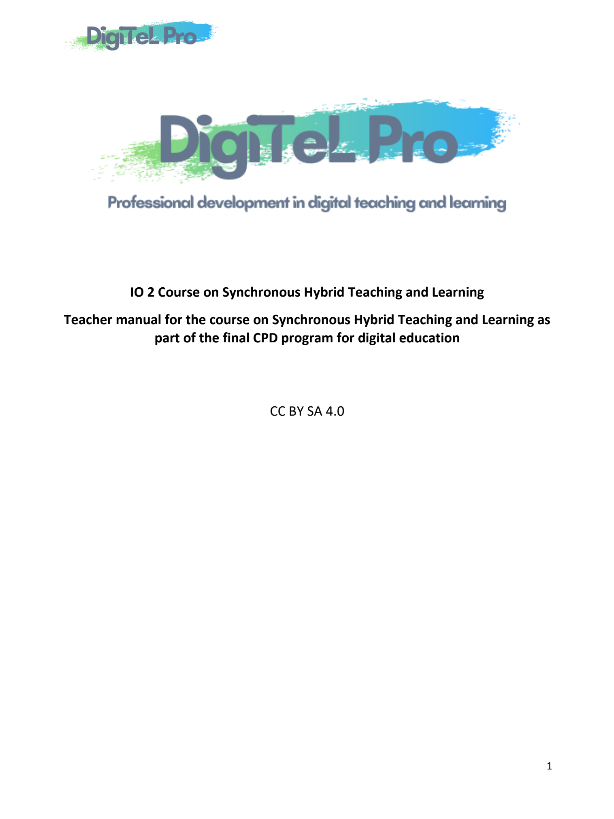
A final CPD programme for digital education, focusing on the three teaching and learning scenarios, students readiness for online learning, and institutional change
This report is set up as a teacher manual guiding you through the objectives of the course and the design of the course. The manual described in a detailed way all the course materials and worksheets which can be used for CPS on synchronous which have been made available as a result of the Digitel Pro project. It will provide you with a plan of action or roadmap to teach the course yourself within your institution. Of course, you can adapt the program to what your students or colleagues need or to the needs of your institution.
Design and development of continuous professional development for blended education and teaching
The TU Delft developed a course for blended teaching and learning. Blended learning is a course design with a deliberate combination of online and offline learning activities. The course is based on recent research, innovation and good practices by the expert group (TU Delft, KU Leuven CIPT). After the first COVID-19 wave, many teaching staff and universities started with rethinking education, keeping students on campus for face to face education, but combining this with online learning to meet the constraints of physical space and distance. Many institutions were already experimenting with blended scenarios.
The TU Delft designed, developed and implemented a continuous professional development (CPD) course to enhance blended teaching and learning, making use of the EMBED maturity model and guidelines and connecting with institutional change.
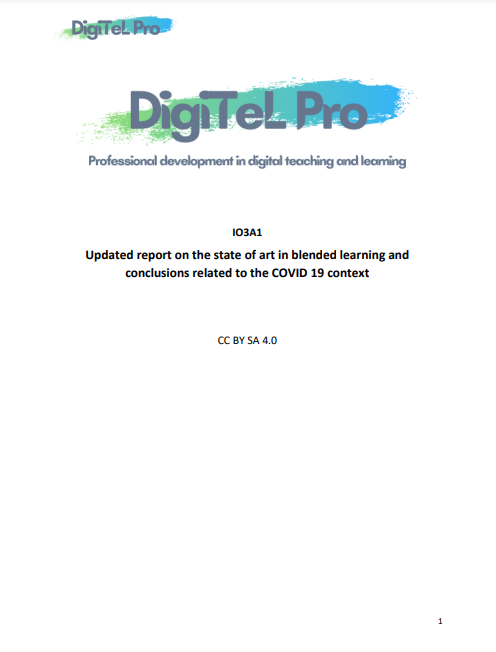
Updated report on the state of art in blended learning and conclusions related to the COVID-19 context
Concise analysis of the recent research and innovation in the literature oriented to the design and development of on blended learning, taking into account the needs of teaching staff and teaching support staff in an emergency situation and conditions for change management.This is a limited analysis (a) completing the literature review from 2018 on and (b) refocusing the conclusions on the COVID 19 needs as the partners have already made a comprehensive analysis for the EMBED project.
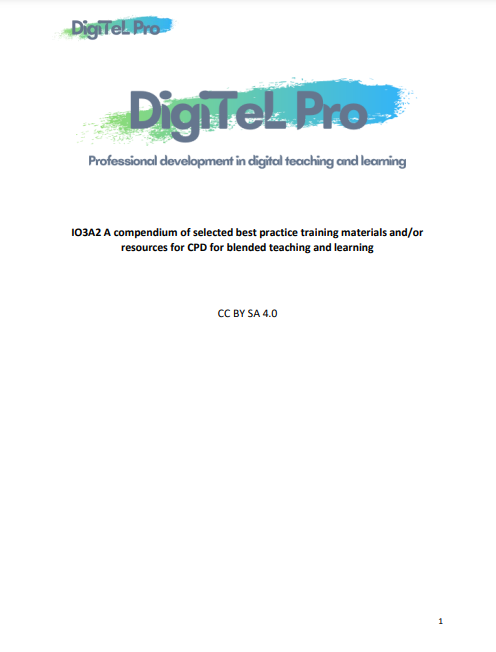
A compendium of selected best practice training materials and/or resources for CPD for blended teaching and learning
Selecting existing best practice training materials and/or resources for CPD for COVID 19-proof blended teaching and learning in the partnership. Point of departure are materials already used during the emergency period and from training events for the EMBED project, including the FutureLearn MOOC “Making blended learning work”. All are related to maturity dimensions, eg activating learning, interaction, flexibility, inclusiveness and the student experience
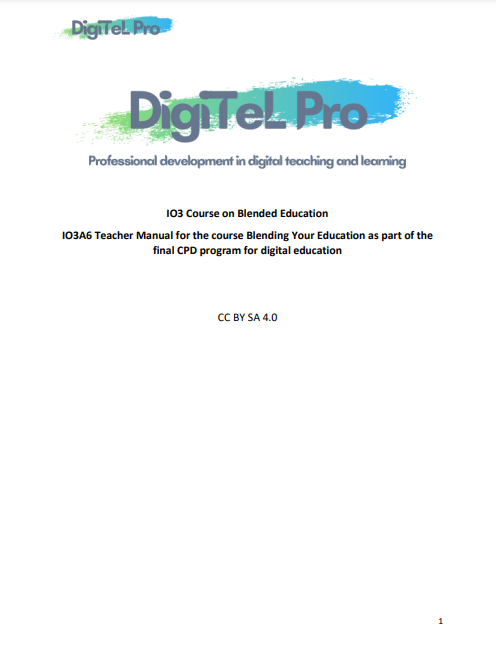
A final CPD programme for digital education, focusing on the three teachign and learning scenarios, student readiness for online learning, and institutional change; teacher manual
Development of a sustainable joint DigiTeL Procontinuous professional development programme for blended learning in the post-COVID era (100 hrs workload for the three scenarios together). The modules of this programme are based on the courses of all three learning scenarios.
This report includes the teacher manual.
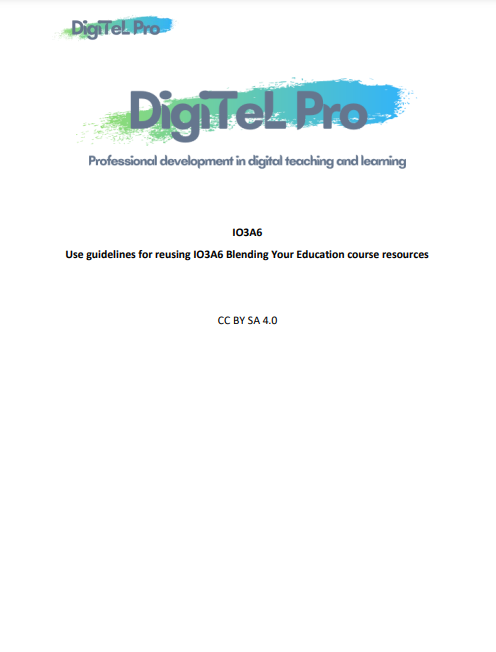
A final CPD programme for digital education, focusing on the three teachign and learning scenarios, student readiness for online learning, and institutional change; user guidelines
Development of a sustainable joint DigiTeL Pro continuous professional development programme for blended learning in the post-COVID era (100 hrs workload for the three scenarios together). The modules of this programme are based on the courses of all three learning scenarios.
This report includes the user guidelines.
Design and development of continuous professional development for online and distance education
Online and distance univerisities; The UOC, The Open Universiteit and UNINETTUNO, developed a CPD course for the scenario of online and distance education, suitable for a total lockdown scenario due to COVID-19. In online and distance education, learners are free from the constraints of time, pace and place of study. Various technologies are used to facilitate communication. In the European context, online and distance education was up to now mostly targeting non-traditional students.
The appearance of MOOCs has changed the attitude to online learning in the mainstream. Even when they taught before already online courses or MOOCs, universities experienced that their expertise in online and distance education was not enough developed to cope with the COVID lockdown. But there are seeds to grow. Even when first practices were difficult, universities and staff got aware of the opportunities of online education. Also after COVID, online and distance education will be a solution for some issues, eg for part-time and adult students, continuing education, international education and mobility. Online and distance education is high quality, accessible, scalable and cost-effective when it is professionally developed. The open universities are experts in this field and prepared a DigTeL Pro CPD course for online and distance teaching and learning.
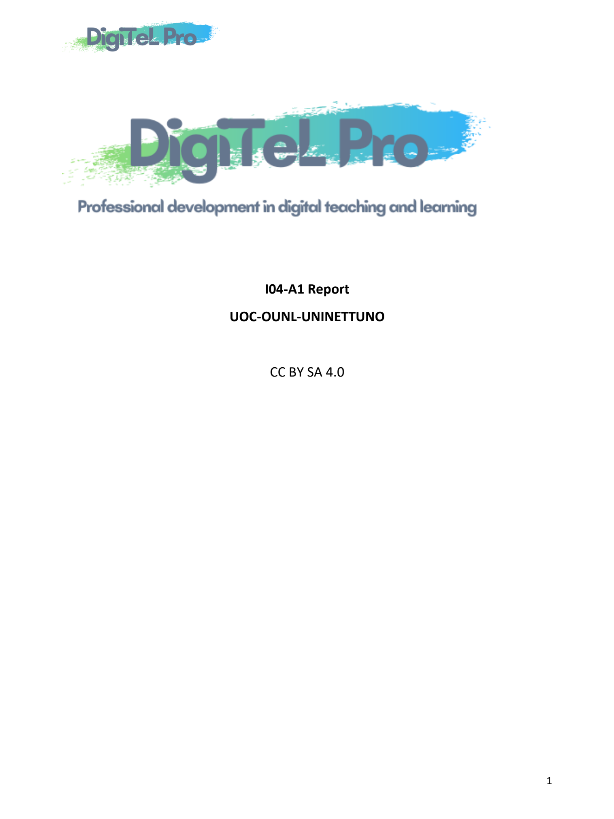
An open access report on the state of art research, innovation and good practices of online and distance education
This report is a synthesis of contemporary research oriented to the design and development of online and distance learning, taking into account the needs in an emergency situation and conditions for change management.This is a limited analysis completing recent literature reviews (2019, 2020) and refocusing the conclusions on the COVID-19 needs.
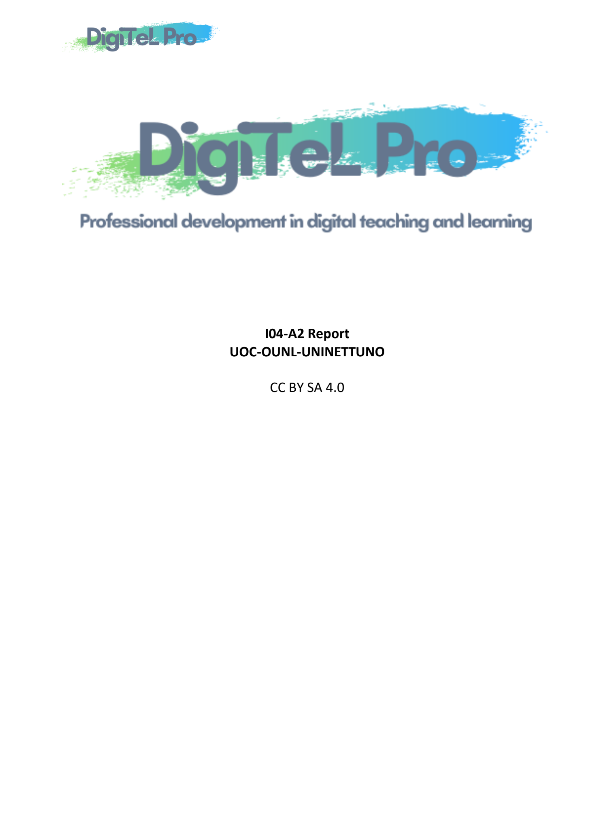
A compendium of selected best practice training materials and or resources for CPD for online and distance learning
This document details the best practices and resources within the Open Universiteit, the UOC, and UNINETTUNO, to allow for a better understanding of their operations within an online educational background.
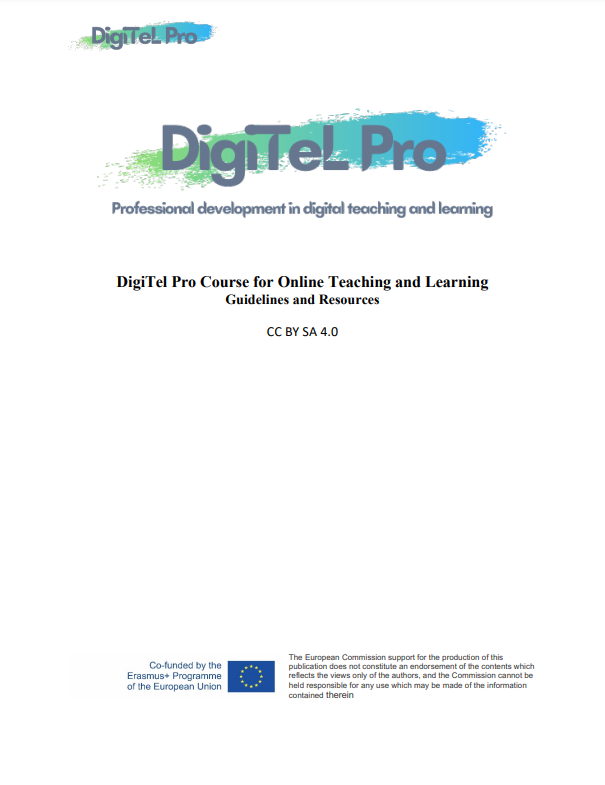
A final CPD programme for digital education, focusing on the three teaching and learning scenarios, student readiness for online learning, and institutional change
Development of a sustainable joint DigiTeL PRO continuous professional development programme for digital learning in the post-COVID era. The workload is 100 hrs workload for the three scenarios together.
The design of course modules to enhance students’ readiness for digital learning
A preliminary condition for a successful digital learning experience is that students are ready for digital learning (student readiness) and that their learning experience throughout the course is continuously supported. This is the focus of DCU experts, strengthening the nexus or reciprocity between teaching and learning. In DigiTeL Pro, the focus is not only on the teaching staff but unambiguously also on students’ study readiness and learning experience in which interaction and conversation play a vital role.
An important condition for student readiness is for example related to the right places and spaces for learning. In COVID-19 times, many students feel this as a burden as studying at home happens under different social conditions. To optimize collaborative and blended education, many universities organize already rich learning environments for hybrid and blended learning: learning spaces with facilities for individual or collaborative learning where students have all tools at hand. Even when lectures are closed, these spaces create a convenient place of study. The CDP programme will show good examples of such spaces, which enable students to upgrade their learning experience, even in Corona times. Rich learning environments are more than a LMS, it is also about the architecture of a university.Important for a positive learning experience is that students are harnessed with digital tools. In course and programme design, digital education has to assure that the course connects with these tools and leaves nobody alone, e.g. because of social reasons. Programmes have to make sure that provisions are made for training digital (learning) skills.
DCU developed course modules to enhance students’ readiness for online learning, based on recent course material and crowdsourced learning experiences of students in digital learning. They also harvested and synthesized expertise and good examples from the partnership on enhancing the learning experience in (synchronous) hybrid, blended and online and distance learning.
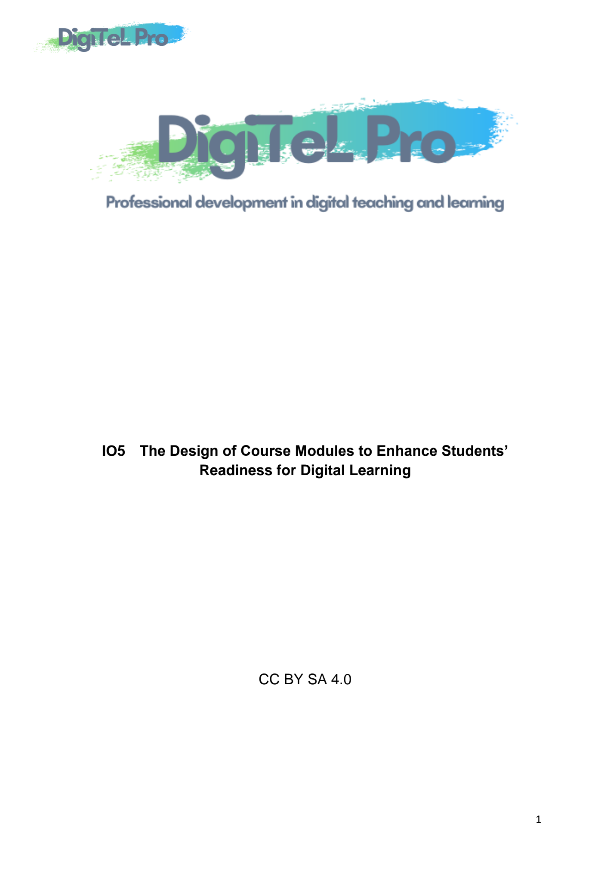
Student Readiness for Digital Learning
This article is a synthesis of contemporary research oriented to promoting students’ digital readiness for online learning, including harvesting key lessons from existing innovations by the three groups (synchronous hybes, blended and online education). This output reflects a strong student-centered perspective.
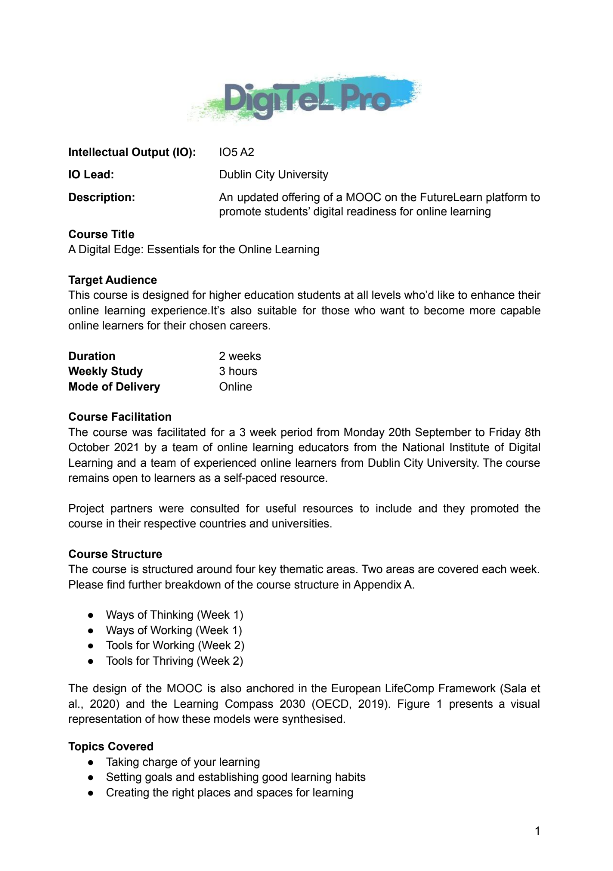
An updated offering of a MOOC on the FutureLearn platform to promote students' digital readiness for online learning
Developing, enhancing and delivering another iteration of “A Digital Edge: Essentials for the Online Learner” through the FutureLearn platform. Notably, the first offering of this MOOC was co-designed and co-facilitated by students and formally supported by the DCU Students’ Union and the Irish Universities Association (IUA). The MOOC was specifically designed to promote student digital readiness anchored around the Lifecomp Framework (European Commission, 2020). This updated offering incorporates key lessons based on the first iteration.
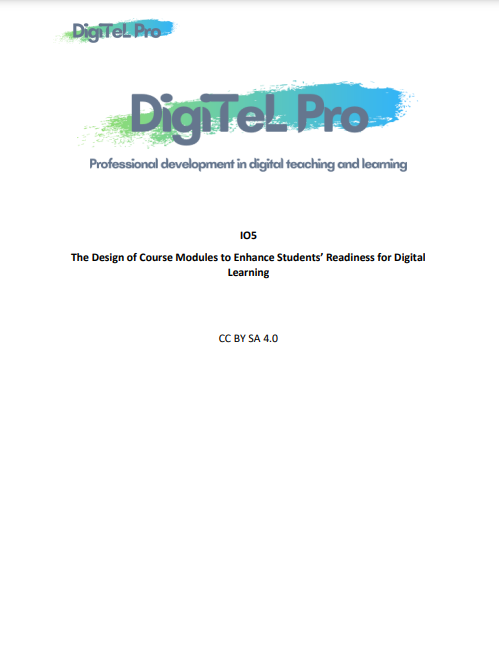
An open access publishable report providing a crowdsourced guide to being an effective online learner
Redevelopment of a Crowdsourced Guide to Being an Effective Online Learner which aggregates and reports what learners have to say is most important in order to be an effective online learner. This output produces an updated version of a previously published learner’s guide to learning online (Futurelearn, 2015), with an even stronger focus on digital readiness from a student’s perspective.
Institutional policies and strategies for digital education
Institutional policies and strategies are important to create the framework and conditions for digital teaching and learning.
The May 2020 reports of EAC show that 95,1% of the universities organized online distance learning and even 82,7 organized online exams during the lockdown. All had to set-up massive support for online teaching and learning. Lecture halls are equipped with screens, cameras and microphones. At all levels, emergency decisions were made. This is the situation with which DigiTeL Pro connects. Next to the courses, experts developed recommendations for leaders regarding the implementation of digital education at a high level of maturity and quality. Synchronous hybrid, blended and online and distance require innovative institutional frameworks and conditions.
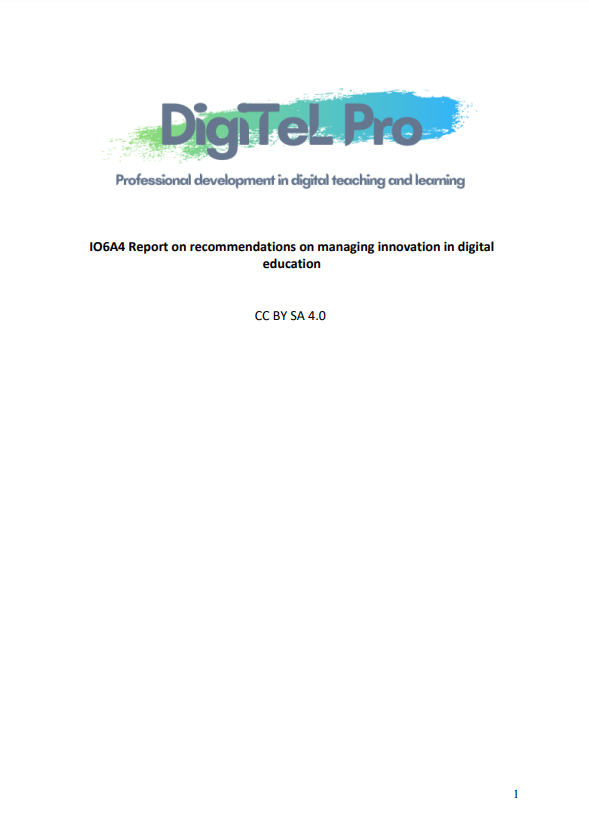
Report on recommendations on managing innovation in digital education
Recommendations for managing innovation in digital education. Based on the former activities joint recommendations were developed for (a shared) institutional leadership for managing innovation in digital education. These recommendations were widely distributed via website and multiplier events to universities and university alliances.
